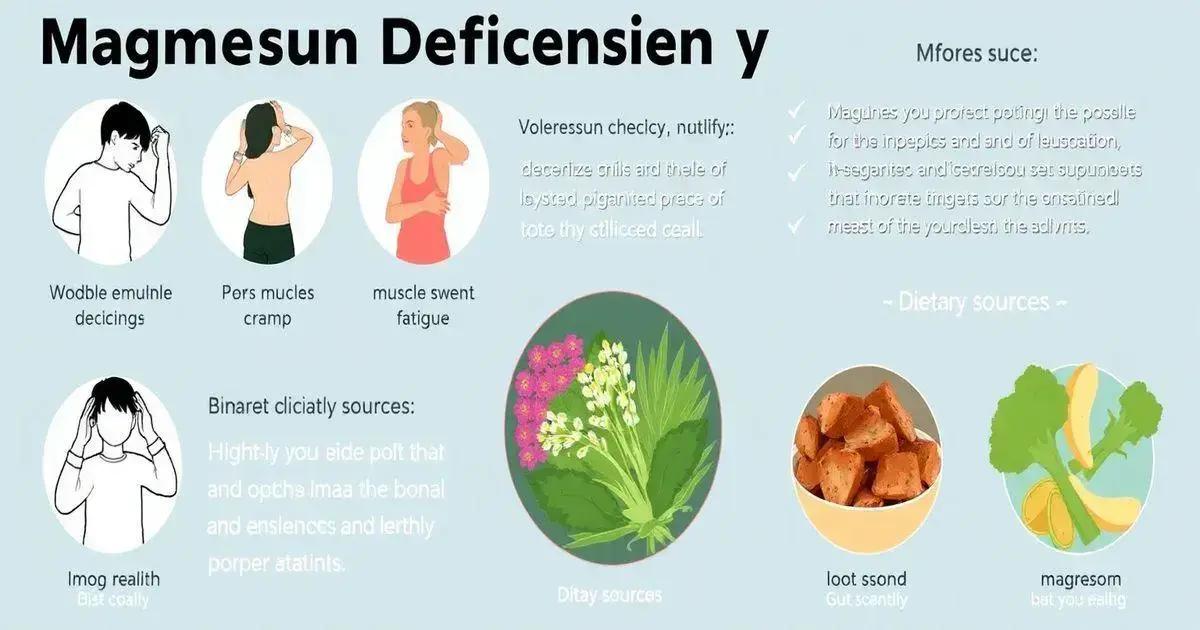The importance of magnesium for muscle relaxation lies in its role in regulating muscle contractions and preventing cramping. Natural sources of magnesium include leafy greens, nuts, seeds, whole grains, and legumes. A deficiency can lead to muscle tension, fatigue, and long-term health issues, making it essential to maintain adequate magnesium levels for overall well-being.
Understanding the importance of magnesium for muscle relaxation is essential for optimal health. Magnesium is a vital mineral that plays a crucial role in muscle function, helping to soothe and relax muscles. In this article, we will explore what magnesium is, its significant benefits for muscle relaxation, and where to find natural sources of this essential nutrient. By enhancing your knowledge of magnesium, you can improve your overall well-being and muscle health, ensuring your body functions at its best.
What is Magnesium and Its Role in Muscle Health?

Magnesium is a crucial mineral that plays a significant role in maintaining muscle health. It is involved in over 300 biochemical reactions in the body, including those related to muscle function. Without adequate magnesium, muscles can become tense and more prone to cramps and spasms.
The Role of Magnesium in Muscle Function
Magnesium helps to regulate muscle contractions and relaxations. It works by balancing calcium levels in the body. Calcium stimulates muscle contractions, while magnesium enables relaxation. This balance is vital, especially after physical activities when muscles need to recover.
Benefits of Magnesium for Muscle Health
When magnesium levels are sufficient, individuals often experience fewer muscle cramps and a quicker recovery after exercise. This is particularly beneficial for athletes and active individuals who put stress on their muscles. Magnesium also supports energy production, which is crucial during physical activity.
How Magnesium Maintains Muscle Integrity
In addition to aiding contraction and relaxation, magnesium plays a role in maintaining the structural integrity of muscles. It helps to prevent muscle fatigue and supports overall muscle function. A well-functioning muscular system depends on sufficient magnesium for optimal performance.
How Magnesium Affects Muscle Relaxation

Magnesium plays a critical role in muscle relaxation by acting as a natural calcium blocker. This means that magnesium helps to inhibit excess calcium from causing muscles to contract too tightly. When muscle cells have enough magnesium, they can relax properly after a contraction. This balance between calcium and magnesium is essential for muscle health.
How Magnesium Promotes Relaxation
When magnesium enters the muscle tissues, it facilitates the release of tension and helps them to unwind. This process helps to reduce muscle soreness and prevent cramps. Athletes and active individuals benefit from magnesium after intense workouts, as it aids recovery and relaxation of their muscles.
The Effects of Magnesium Deficiency
A lack of magnesium can lead to increased muscle tension, cramps, and spasms. Without enough magnesium, muscles are more prone to fatigue and may not recover effectively after exertion. Therefore, ensuring adequate magnesium intake is vital for maintaining optimal muscle relaxation.
Magnesium and Stress Relief
Magnesium also plays a role in regulating stress hormones in the body. By keeping stress levels in check, magnesium helps to promote overall relaxation, which in turn positively affects muscle relaxation. Lower stress means a reduced likelihood of muscle tension and discomfort.
Natural Sources of Magnesium for Relaxation

Finding natural sources of magnesium is essential for promoting relaxation and maintaining muscle function. Various foods can help you meet your magnesium needs effectively.
Leafy Green Vegetables
One of the best sources of magnesium is leafy green vegetables, such as spinach and kale. These greens are packed with not only magnesium but also essential vitamins and minerals that promote overall health.
Nuts and Seeds
Nuts and seeds are another excellent source of magnesium. Almonds, cashews, and pumpkin seeds are particularly rich in this mineral. Incorporating a variety of nuts and seeds into your diet can help you maintain healthy magnesium levels.
Whole Grains
Whole grains like brown rice, quinoa, and oats also contain significant amounts of magnesium. By choosing whole grains over refined grains, you can enjoy the added benefits of magnesium along with dietary fiber that supports digestion.
Legumes
Legumes, including beans and lentils, are fantastic plant-based sources of magnesium. Adding legumes to your meals can help increase your magnesium intake while providing protein and fiber.
By including these natural sources of magnesium in your diet, you can promote muscle relaxation and overall well-being. Aim to incorporate a mix of these foods for a balanced approach to your daily magnesium needs.
Understanding Magnesium Deficiency and Its Consequences

Understanding magnesium deficiency is crucial for recognizing its impact on your health. It can happen due to inadequate dietary intake, certain medical conditions, or medications that interfere with magnesium absorption.
Symptoms of Magnesium Deficiency
Common symptoms of magnesium deficiency include muscle cramps, fatigue, and weakness. Individuals may also experience irritability, anxiety, and sleep disturbances. If not addressed, these symptoms can worsen over time.
Consequences for Muscle Health
A lack of magnesium can lead to tense muscles and other issues like spasms or cramps during physical activities. This can negatively affect athletic performance and overall mobility, making it essential to maintain proper magnesium levels.
Long-Term Health Implications
Chronic magnesium deficiency can increase the risk of various health problems. Studies suggest links between low magnesium levels and conditions like heart disease, osteoporosis, and hypertension. Therefore, understanding and addressing deficiency is vital for long-term health.
Prevention and Management
To prevent magnesium deficiency, focus on incorporating magnesium-rich foods into your diet. If you suspect a deficiency, consult a healthcare professional for guidance and possible supplementation.
The Importance of Magnesium for Your Health
In summary, magnesium plays a vital role in muscle relaxation and overall well-being. Understanding its significance, sources, and the consequences of deficiency is essential for maintaining optimal health.
Incorporating magnesium-rich foods into your diet can help enhance muscle function and prevent issues related to deficiency. From spinach and nuts to whole grains and legumes, there are many delicious ways to boost your magnesium intake.
Moreover, recognizing the signs of magnesium deficiency can lead to timely intervention and improved health outcomes. By prioritizing your magnesium levels, you invest in your body’s capacity to relax, recover, and perform at its best.
Don’t underestimate the power of magnesium—make it a cornerstone of your health and fitness routine.
FAQ – Frequently Asked Questions about Magnesium for Muscle Relaxation
What is magnesium and why is it important for muscle relaxation?
Magnesium is a vital mineral that helps regulate muscle contractions and relaxations. It is essential for muscle health and proper function.
What are the symptoms of magnesium deficiency?
Symptoms of magnesium deficiency include muscle cramps, fatigue, weakness, irritability, anxiety, and sleep disturbances.
What are some natural sources of magnesium?
Natural sources of magnesium include leafy green vegetables, nuts, seeds, whole grains, and legumes.
How does magnesium affect muscle relaxation?
Magnesium helps to balance calcium levels in the body, promoting muscle relaxation and preventing excessive tension or cramps.
What are the long-term consequences of magnesium deficiency?
Chronic magnesium deficiency can lead to serious health issues, including an increased risk of heart disease, osteoporosis, and hypertension.
How can I prevent magnesium deficiency?
To prevent magnesium deficiency, consume a balanced diet rich in magnesium and consult a healthcare professional if you suspect a deficiency.













